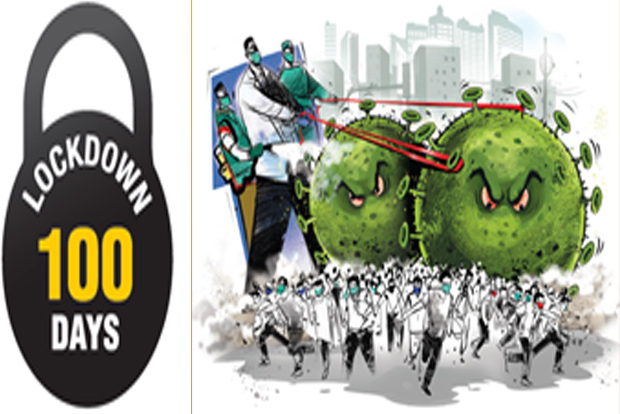Lockdown 100 days: Tackling the Juggernaut
As Tamil Nadu completes 100 days of lockdown today, DT Next takes an inventory of the losses the State had to suffer, what the government could have done to handle the pandemic better and how experts and frontline workers are coping with the situation

Chennai
In the last week of March, handling a coronavirus patient was like handling a mythical dragon. It was a chilling sight to see the infected persons and their relatives were picked up and closely monitored by PPE-clad health workers, which was followed by streets being closed with iron barricades. But 100 days on, the number of cases has exploded, making these are sights that do not trigger fear but only a sense of familiarity and perhaps inevitability. Dealing with coronavirus is the new normal in Tamil Nadu.
According to senior officials, dealing with the pandemic for the past three months has helped doctors and administrators to understand the virus and the effects of lockdown better.
“Tamil Nadu is spending more than Rs 100 crores per month only for testing and tracking COVID patients. This unexpected expenditure has burnt a deep hole into the State exchequer,” a highly placed official told DT Next. The logistics and local body expenditures add another Rs 80 crores per month, the official added. To improve the infrastructure of government hospitals, including ensuring oxygen cylinders and pipelines, another Rs 75 crore was sanctioned for the Public Works Department on Wednesday.
“By imposing a series of lockdowns, the State managed to control the intensity of the virus. Though Tamil Nadu has one of the best public health infrastructure, the demand brought about by the pandemic was far higher and unique when compared to swine flu or dengue outbreaks,” explained Health Secretary J Radhakrishnan.
The advancements in medicine also helped increase recovery rate, with more than 50,000 people having recovered till now. The bed strength has improved by several folds, and the infrastructure facilities like oxygen cylinders and ventilator support have also increased. “We are not looking at the numbers now; the focus is to improve critical care at the hospitals. There are loopholes, but we are improving the system. Non-medical methods and other forms of alternative medicines like Siddha and Ayurveda are also given impetus,” Radhakrishnan added.
‘It is time for us to move to a monitored home and community-based care model for those who are asymptomatic or mildly symptomatic,” said Principal Secretary B Chandramohan, who is the COVID monitoring officer for Madurai, a district that has been recording a spike in the recent days. Asymptomatic and mild patients should not occupy beds needed for the seriously ill ones, and work was on to double the number of beds with oxygen facility, he added.
The expertise gained from the three months’ experience handling the pandemic was shared for fine-tuning the processes, Chandramohan said, citing the examples of deciding when pulse oximeter should be used for effective management and how a physician can speed up the treatment while waiting for COVID results.
“Chennai is an IT hub, a potential that has to be tapped and synchronised for better medical care. Besides the healthcare improvements, IT tools will soon be part of the medical care approach. Works are on for this. This will give more data and precision to reduce mortality rate in the coming days,” added senior official Rajesh Lakhoni, who is the monitoring officer for Vellore. Until a vaccine or medicine emerges, the public should not lower protective guards, the official added.
According to politicians and political commentators, the pandemic and its aftermath would be the topic for the AIADMK and DMK in the coming Assembly polls scheduled for next year. “Corona has dwarfed every other political issue, and its effects like loss of lives, livelihood and the rate of recovery will determine the results in the upcoming assembly polls,” opined political commentator R Mani.
Visit news.dtnext.in to explore our interactive epaper!
Download the DT Next app for more exciting features!
Click here for iOS
Click here for Android



